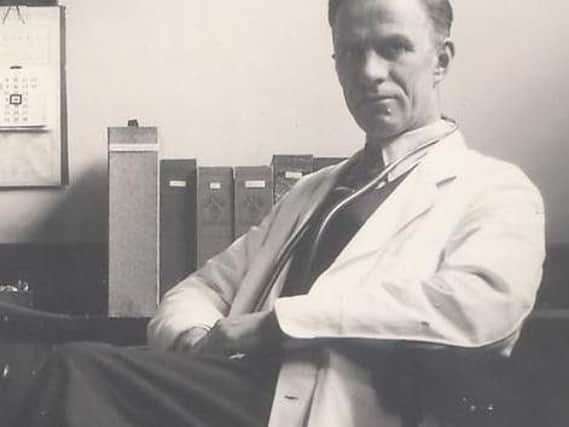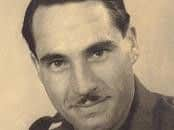Fighting the good fight - or refusing to go to war


John Broom, who lives in Penistone, was inspired to write Fight the Good Fight by his late father, also John Broom. His is one of 20 stories that the book tells from World War Two.
John senior was a furniture salesman in a department store and lived in Colchester, Essex.


Advertisement
Hide AdAdvertisement
Hide AdJohn said: “Ten years ago I inherited from a distant relative 170 letters he’d written during the Second World War. He was in the Desert Rats, serving all over north Africa.
“It came across how important his Christian faith was to him during the war years. I wondered how typical he was and how prevalent that was.”
He began researching the issue for his PhD studies at Durham University and then decided to write the book.
John said what struck him was the different routes that faith took people down, from the conscientious objectors who refused to break the sixth Commandment, ‘thou shalt not kill’ to others who felt that they had to contribute to the war effort for a variety of reasons.


Advertisement
Hide AdAdvertisement
Hide AdJohn’s father joined the Royal Army Medical Corps aged 23 in 1940 because he wasn’t comfortable with the idea of taking another person’s life but felt he “had to do his duty to his country and what he thought was right at that time”.
John senior’s early letters showed he hated the strict discipline of army life, being told when he could visit his family, and resented being ordered about during training.
But “by the end of the war he was part of the finest body of men who ever existed”.
John added: “His letters say he can’t see how he can adapt to civil life and said no-one who’s spent the war at home could understand that.”
Advertisement
Hide AdAdvertisement
Hide AdThe letters were a revelation because John’s father never really spoke about his war service. “That generation didn’t really talk a lot about it.
“Now we’re down to a few people in their 90s and we’re desperate to get their last bits of information.
“The tenacity of that generation meant they were just getting on with it and doing what was required.”
He thinks that his father would now approve of John’s book, despite his reticence. “I’ve met some remarkable individuals who took part in the war and were keen to tell their story, still keeping it within living memory,” he added.
Advertisement
Hide AdAdvertisement
Hide AdIn other cases, families told the stories, including that of Michael Benn, an RAF pilot who died in a training accident in 1944.
The elder brother of ex-Chesterfield MP Tony Benn, who would have inherited the peerage that his brother turned down, was the son of Labour cabinet minister Air Commodore William Wedgwood Benn.
William won the Distinguished Flying Cross in World War One and his son followed him, joining the RAF even though he had been thinking about training for the ministry.
John said: “When up in the air he felt he was very close to eternity and very close to God.”
Advertisement
Hide AdAdvertisement
Hide AdHis death devastated the family and Tony Benn talks about it in his autobiography.
Michael’s nephew, Labour MP Hilary Benn, and his family gave John access to his papers.
John said that he looked at private papers, Michael’s uniform and the Distinguished Flying Cross in the Benns’ Essex home, Stansgate House, in Tony Benn’s holiday bedroom, not long after he had died.
“It was an amazing experience. I’d grown up interested in politics and history and seen Tony Benn speak at various places. It made me think of what we lost with the death of Michael Benn and so many Michael Benns.”
Advertisement
Hide AdAdvertisement
Hide AdOne man who told his own amazing story is Dr Bill Frankland, who is 104.
John said: “He was a doctor and when war came, he volunteered for the Royal Army Medical Corps and was taken prisoner of war in Singapore in 1942.
“He survived death so many times. On one occasion he and another doctor spun a coin to decide who was going to go to one military hospital or another.
“The other guy a couple of months later was at the Alexandra Hospital when the Japanese took Singapore and massacred everyone they could find there. That guy’s life was taken.”
Advertisement
Hide AdAdvertisement
Hide AdJohn said that Bill, a captain, was badly beaten on many occasions as the guards punished the officers when anyone stepped out of line.
The atomic bombs that killed so many in Japan saved prisoners like Bill because the country surrendered.
After the war, Bill worked with Alexander Fleming on developing penicillin and became a leading immunologist. His incredible career continued until he was more than 100 years old.
He came up with the idea of the pollen count to help people with allergies.
Advertisement
Hide AdAdvertisement
Hide AdJohn said: “Despite all his experience with the Japanese, he said, ‘You must not go on hating people. It does you harm but it does not do them any harm. I am a Christian and that is not how I live my life’.”
John said: “It’s been a wonderful journey, meeting some very remarkable people. Personally sharing their experiences, or children of those people being willing to share stories, has been very humbling and a real privilege.”
Fight the Good Fight: Voices of Faith from the Second World War, published by Barnsley firm Pen & Sword Books, is the second in a series. The first one looked at World War One stories, including that of Conisbrough’s Bert Brocklesby.
He was a conscientious objector, one of the Richmond 16 who featured in a recent Retro. A Methodist preacher, he faced the death sentence and was eventually jailed.
Advertisement
Hide AdAdvertisement
Hide AdHis family, including a brother who survived the Somme in 1916, supported Bert.
n Contact John by emailing [email protected] or you can write to him at 12 Park Avenue, Penistone, S36 6DN.
He will provide signed copies of his book for £20 including p+p.
He also has a website, www.faithinwartime.wordpress.com. John is always on the lookout for more stories about faith and war and will be glad to hear from anyone who wants to get in touch with him.
Pen & Sword’s website is www.pen-and-sword.co.uk